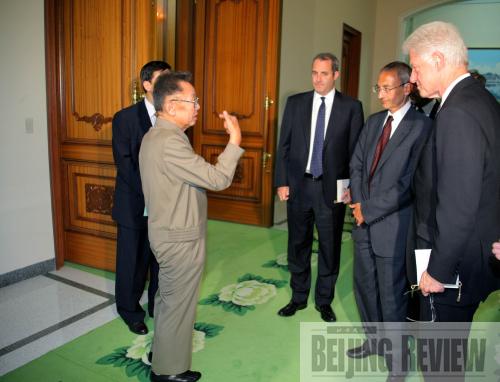|
 |
|
MUTUAL UNDERSTANDING: North Korean leader Kim Jong Il meets with visiting former U.S. President Bill Clinton in Pyongyang on August 4 XINHUA/KCNA |
Former U.S. President Bill Clinton's recent mediation on behalf of two American journalists detained in North Korea finally brought the months-long stalemate to a close. Analysts in Washington argue Clinton's visit bore a profound political meaning, one that can be regarded as a win-win result in this political game.
The right man
On March 17 American journalists Laura Ling, who is of Chinese origin, and Euna Lee, who is of South Korean lineage, were detained along the China-North Korea border.
On June 8, each received a sentence of 12 years of hard labor for illegally entering North Korea and engaging in hostile acts by the North Korean Central Court. Since the United States and North Korea have no diplomatic relations, the matter was publicly handled by the Swedish Government.
But in truth, direct negotiations had long since begun behind closed doors.
A diplomatic source revealed to South Korea's Yonhap News Agency that the United States entered into secret contact with North Korea through Pyongyang's resident UN delegation, also known as the "New York Channel," immediately after the pair was arrested. Their disputes focused on which level of officialdom the United States should send to North Korea for negotiations.
At first, the Obama administration did not want it to be connected with the nuclear issue, so an unofficial representative was preferred. However, North Korea insisted that a high-ranking official be sent to bring home the two journalists.
The American media later revealed that the U.S. Government had considered many political figures including former Vice President Al Gore and New Mexico Governor Bill Richardson. But none were accepted by North Korea. What North Korea expected was an influential "big shot," analysts said. Still, "unofficial" and "private" were the bottom line for the United States.
Thus, former President Clinton became a natural choice—the one North Korea longed for, and the one the United States would permit.
A win-win release
North Korea, first of all, has succeeded in forcing the Obama administration to send a former president to its shores—a big diplomatic coup in itself. Having suffered from international sanctions, North Korea took it as an important symbol, breaking blockades and displaying power and prestige. Scott A. Snyder, a famous American expert on North Korea issues, said this is exactly what North Korea wants most.
| 